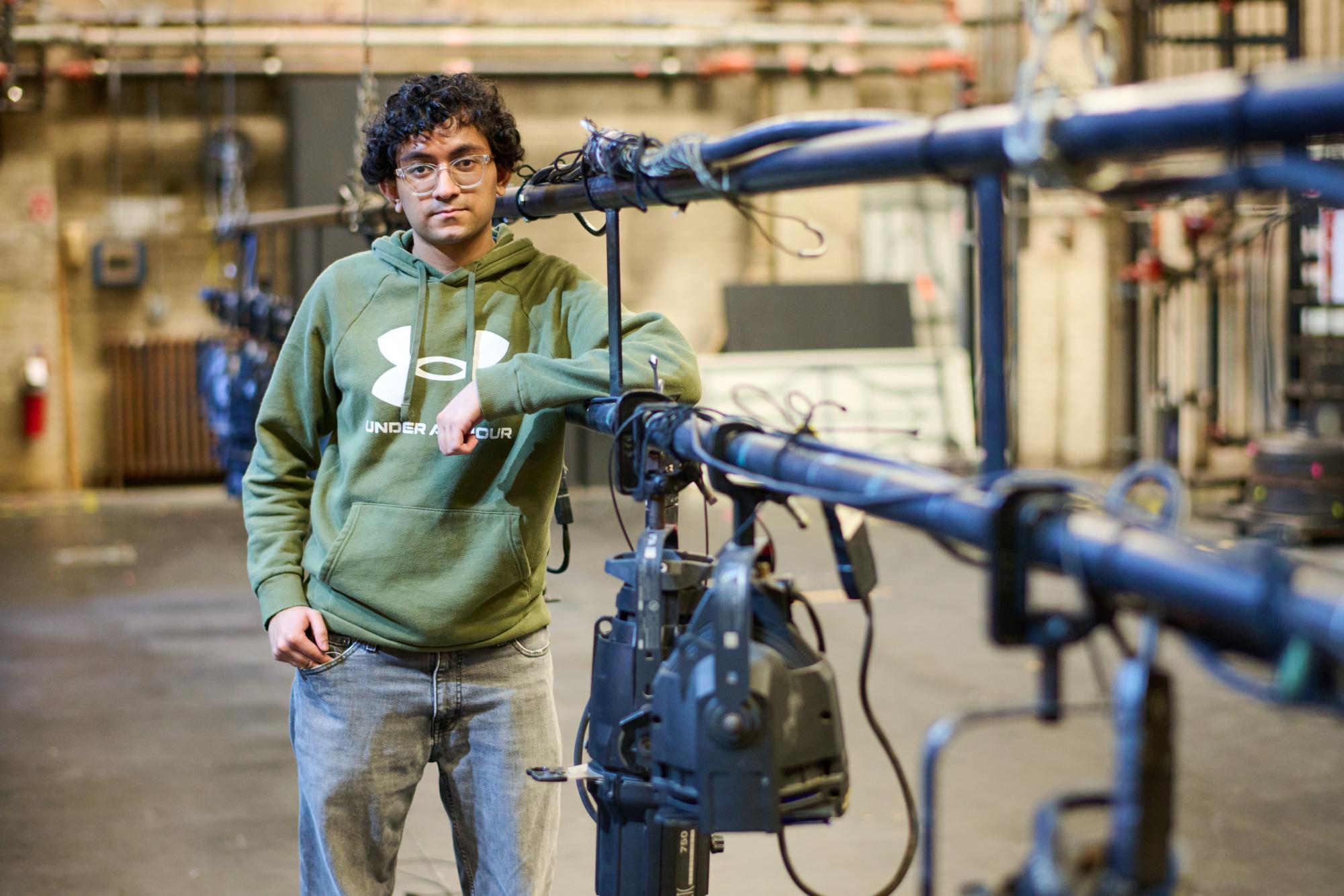Behind the curtains, stage crews make productions possible at Pitt Stages


Krishna Amin, sound designer/engineer and junior theatre arts and mathematics major, poses for a photo among stage lights.
Pitt’s theater program is a place for student creativity and talent to take center stage — but while the spotlights are focused up front, plenty of work goes on behind the scenes to make each production possible. The theater runs several shows throughout the year, from fall and spring plays to the spring musical, culminating in hours of work from all departments.
Isabel Sinnott, a junior theater major, is a part of the lighting crew and works as a light designer for productions. She says she found an interest in lighting in high school and loves working with it because of the layers it can give to a story.
“Lighting particularly interested me because it’s something that you can see but you don’t necessarily think about, and it really adds to the emotion and mood of the story,” Sinnott said. “It can be fascinating because lights can move and can add to the music and to the story.”
Sinnott said the process of lighting design requires a lot of planning before each production in order for the final product to be possible.
“I have meetings with the director several months ahead of time to talk over what their vision is for the show, and then I come up with ideas for how I can put up lights in the space to reflect that,” Sinnott said. “I create a light plot using a program called Vectorworks to place lights where I like them in the space, and then I help direct the electricians as to where to focus them. After that, I spend about a week or so before the production programming them in.”
Krishna Amin, a junior math and theater major, explained a similar process for sound designers, saying they have to attend production meetings and plan out sound effects well before the production occurs.
“It begins a couple of months beforehand with the whole creative team, all the designers — the light designer, sound designer, set designer, director and choreographer — you all come together and talk about the production in general and what you want the vibes to be and what you want to convey,” Amin said. “So you’re in the research phase, and then slowly you start finding or making sound effects, and once you have all the sound effects for the show you put them in a program called QLab.”
Pitt’s theater department provides experience at a level comparable to professional theaters. Amin said the experiences he’s gained working in the sound department are invaluable and have given him the ability to actively participate in each production.
“We very much work like a nonprofit professional theater, which is great, and I think the fact that undergraduates can do things is really great,” Amin said. “I got so much experience working in this kind of setting, like going to design meetings, going to production meetings, how to talk to a director, how to handle yourself during tech week.”
Lynn Slutsky, a senior computer science major, echoed this sentiment. They said working with the sound crew has provided them with tools for working post-graduation, thanks to the work students do with professors and on their own.
“It’s taught me certainly a lot more independence, in that you’re working being mentored under Pitt staff, and so you work really closely with the professors here and they teach you what you need to know. But you also have this role on the production, and it’s teaching you exactly what that would be, as if you were in a professional environment,” Slutsky said. “So you’re able to easily enter the workforce after, because you‘ve done the job already, just in a collegiate setting.”
Slutsky joined the sound crew because of the creative and technical skills it teaches. They said they have gained experience in several positions, from sound designer to audio engineer.
“It’s the intersection between technology and art. So it’s something that’s complicated and there’s a lot of science behind it, but you’re still creating something that’s like art for the public,” Slutsky said.
The theater department welcomes students with all levels of experience to help out during productions. Even with minimal knowledge of theater operations, interested students are given guidance by professors and student leaders. Slutsky said Pitt’s theater department’s accessibility helps create great opportunities for students to learn more about working on productions.
“You can get involved in theater at Pitt at any level that you want to, whether that’s just coming in for ‘hang and focus,’ which is like putting the lights in the air and then pointing them where the designer wants them to go, or you can sign up to take a full position on the show and everyone here will help you understand and thrive in that role,” Slutsky said. “Whether you just want to be involved in clubs or in department productions, there’s always a place for you to jump in and learn as you go.”
Sinnott agreed, saying students’ ability to join the theater department is a great way to meet new people and gain new experiences.
“The department is very open, so you can try all kinds of theater and all kinds of tech, even if lighting isn’t your specialty,” Sinnott said. “It’s very easy to get involved. It’s a great way to spend time with a lot of people, and it’s very rewarding when you finally get to the end and you get to see the entire product that you’ve created.”
Recent Posts
Review | Tyler, the Creator and friends come to Pittsburgh on the ‘Chromakopia’ tour
With the release of his eighth studio album, “Chromakopia,” decorated rapper, songwriter and producer Tyler,…
A Good Hill to Die On // The motivation we all need
In this post of “A Good Hill to Die On,” staff writer Sierra O’Neil discusses…
Who Asked? // Is it really the damn phones?
This installment of Who Asked? by staff writer Brynn Murawski describes her brief journey limiting…
Students are ‘upset, but not surprised’ over denial of gender affirming care at UPMC CHP
Pitt students and LGBTQIA+ members express their concerns about the recent denial of gender affirming…
Take Madness Final Four | Battle of Pennsylvania, 412 and Just Outside of Philly clash
Welcome to the Final Four of Take Madness! We are down to four talented writers,…
Column | Best Sports Environments in Pittsburgh
Pittsburgh is undoubtedly one of the best sports cities in America. A deeply passionate fanbase…

